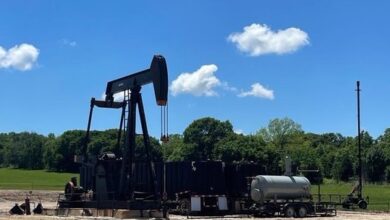Oil, gas industry must address hidden costs impeding digital transformation
By Karen Boman, Associate Editor

The oil and gas industry must address the hidden costs of a digital transformation – including costs associated with training its workforce and changing its business processes – in order to successfully adopt digital technologies into its operations, said Bruce Bailie, Digital Officer for Siemens’ Oil & Gas Americas division, on 30 April at the 2018 Offshore Technology Conference in Houston.
Digital technologies have already transformed the personal lives of millions of people: how they work, how they shop and even the medical treatment they receive. Industries such as automotive have also seen tremendous improvements in cycle times and reduced engineering with the aid of digital technologies. Despite the potential for such benefits, the oil and gas industry continues to lag behind other industries in the digital journey. Safety is one key reason. “Given that oil and gas is a hazardous environment, safety has to be the priority. And when you have that in mind, you have to build a conservative culture,” Mr Bailie said.
Another reason is the fact that oil and gas assets are expected to run for 20 to 30 years – with limited downtime for servicing machines and replacing instrumentation. By contrast, industries such as automotive have shorter asset run times, making it easier to add new instrumentation. The high cost of downtime in oil and gas presents another challenge.
Cybersecurity fears also have impeded digitalization. “One could argue that the oil and gas industry’s effort to reduce cybersecurity risks for its existing infrastructure and business systems should not impede its adoption of new digital technologies,” Mr Bailie noted. “However, industry’s focus on existing cyberthreats is still a significant impediment to adopting digital technologies.”
To succeed on its digital journey, oil and gas companies must recruit workers with digital expertise. “You’re looking for data scientists and people with expertise in robotics, artificial intelligence and cybersecurity,” Mr Bailie said. Because oil and gas companies are competing with the likes of Amazon and Google for these workers, who are in short supply, he recommended that oil and gas companies change their approach to recruiting and be open to creating collaborative work environments to attract younger workers. In particular, Millennials gravitate toward companies where they can work in Millennium-driven environments with their peers.
Another hidden cost is that business processes also must change and workers need to be trained on these new processes. “When you look at business process changes, it’s not just about a particular activity but the whole supply chain and adjacent and connected processes,” Mr Bailie said. “When you look at any change, it’s going to be people first, then processes and then technology. An investment in change management is an area that’s nearly usually ignored or highly underestimated,” Mr Bailie explained.
Oil and gas companies are right to carefully evaluate technologies and fully understand them before deploying them, but they shouldn’t just dismiss digital technologies outright as too risky without investigating.
“When you look at sharing data, there is a lot of data that can be shared which has no business risk at all. It’s not proprietary, doesn’t give any indication of production capability or reveal competitive advantage, but there is still a hesitance to share any type of information.”
Because digital technology moves so quickly, company leaders need to create a culture where employees will embrace digital technology. An atmosphere of collaboration is key to successful digital transformation.
“When you overcome the challenge of sharing data and actually having the infrastructure to allow you to share data very specifically, then you get the crowd knowledge,” Mr Bailie said. “You get the OEMs (original equipment manufacturers) providing knowledge and supporting you in specific areas without compromising your business in any way shape or form.”
He used the television show “Who Wants to Be a Millionaire” as an example of crowd knowledge. In most cases, the crowd was correct in the answers it gave to contestants when contestants used the “Ask the Audience” lifeline. Mr Bailie attributed this rate of success to the pooling of knowledge of audience members with different backgrounds of expertise.
Providing encouragement and training to mid-career employees to give them the necessary digital skills also must be a priority for companies. “They’re behind the digital wave, and the wave is going to overtake them, so they feel threatened. How do you address it?” Mr Bailie said. Digital skills training will be needed as industry pursues new technologies, such as edge processing capability, autonomous drones and robots, and artificial intelligence on both the operational and commercial sides of business.
Mr Bailie said that many oil and gas companies are adopting the strategy of being a fast follower, waiting for others to test the waters before jumping in. But he warned that companies shouldn’t wait, noting that fast followers will typically lag behind the early adopters in reaping benefits from digitalization. “Cultural transformation is absolutely imperative,” Mr Bailie said. “And the key part of the transformation is making sure everyone understands this isn’t just a fad.”
For more information, please see OTC 28699, “Effectively Harnessing Data to Navigate the New Normal: Overcoming the Barriers of Digital Adoption,” presented at the 2018 Offshore Technology Conference, 30 April-3 May, Houston, Texas.




